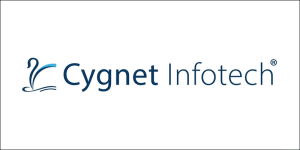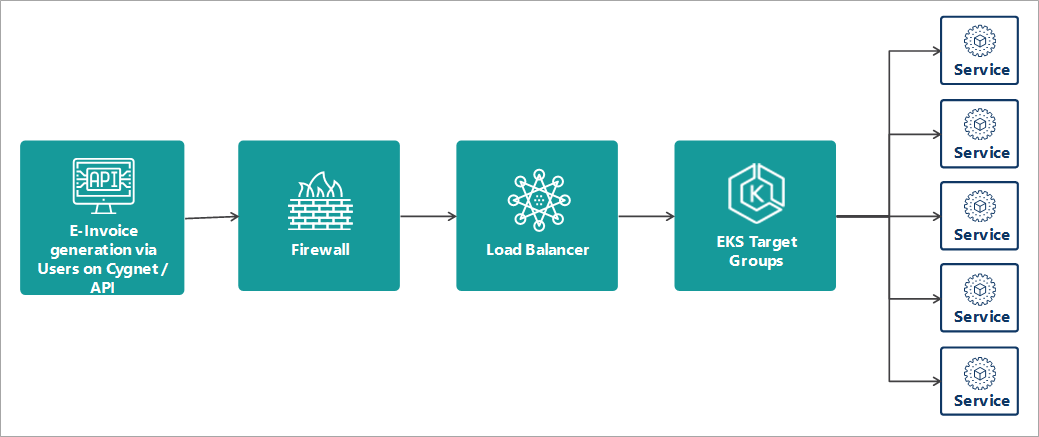We use machine learning technology to do auto-translation. Click "English" on top navigation bar to check Chinese version.
Cygnet Invoice Registration Portal on Amazon Web Services Enables Taxpayers to Seamlessly Generate e-Invoicing
By Rajesh Khunt, VP, Technology and Engineering – Cygnet Infotech
By
Sanjeev Kumar, Sr. Solutions Architect – Amazon Web Services India

|
| Cygnet Infotech |

|
The introduction of GST, known as the
With this, there was a need for businesses to digitize their tax processes to automate reporting and reconciliation of data at the transaction level. The government gradually increased the scope of the compliances, introducing
Historically, the automation of business processes and tax reporting has evolved somewhat independently, or in the worst cases have remained as isolated processes with data staying in silos. The overlap between these functions is increasing with tax authorities demanding more transparency and real-time access to information.
The introduction of e-invoicing in India was one such instance where businesses were required to streamline their processes to generate e-invoices in real time.
In this post, we will highlight the importance of eInvoice Registration Portal in the GST ecosystem and how
Cygnet Infotech is an
GSTN eInvoice Registration Portal
As the government in India is gradually introducing e-invoicing to companies with a lower turnover, thus reducing the e-invoicing threshold, the
The ability to process enormous amounts of data in real time and interconnect with systems makes these private players well-positioned to use data analytics to augment the traditional forms of business processes and finance, target niche markets, and orient their products to maximize consumer satisfaction.
However, tech doesn’t have to mean expensive. It’s essential companies look at the digitization journey not as a compliance burden but to bring direct benefits to businesses and their ecosystems. The interconnected systems and services that enable the GST ecosystem are also increasing the tolerance for switching costs and decreasing the tolerance for solutions that are not adding value to users.
Cygnet IRP Application
The Cygnet Infotech team undertook highly aggressive timelines to build and launch the
The primary goal of Cygnet IRP was to create a modern and robust system capable of efficiently handling large-scale transactions and data without compromising performance. Additionally, the aim was to establish a secure and dependable connection with government backbone systems to ensure compliance and monitoring.
Cygnet Infotech chose Amazon Web Services for hosting its Cygnet IRP platform. This led to several benefits including faster launch times, decreased infrastructure and software management burdens, enhanced reliability and resilience for the platform, better oversight through cloud monitoring and metrics, and strengthened security through cloud-native
The Cygnet IRP platform runs on cloud services including
It utilizes
The platform’s security is ensured through Amazon Web Services-native security tools:

Figure 1 – Cygnet IRP High Level Architecture.
Benefits of Amazon Web Services Cloud and Managed Services
The Amazon Web Services cloud empowers the Cygnet application with agility, elasticity, and scalability. Within this environment, Amazon Web Services hosts a self-healing and stateless application that proactively addresses errors through automated processes.
Using Amazon Web Services’s Active-Active distributed resilient infrastructure, Amazon Route 53 automatically directs 100% of traffic to the surviving site when it detects a failure of the application in the primary region. Amazon Web Services helped Cygnet IRP secure its database, making it highly available and durable with synchronous data replication across multiple Availability Zones.
Leveraging
Amazon Web Services also enables the Cygnet IRP platform to scale up and down instantly to accommodate spikes in infrastructure, which may occur due to sudden increases in e-invoice traffic across a wide range of customer turnovers.
Lastly, Amazon Web Services benefits the end consumers of Cygnet IRP with higher performance, a higher uptime, and uninterrupted services. Cygnet customers already on the Amazon Web Services platform will experience low latency beyond the basic e-invoicing compliance services that Cygnet IRP offers.
Conclusion
Cygnet IRP helps businesses generate e-invoices at speed and offers multiple options to taxpayers, making it easy for them to sign up for e-invoice registration and generation.
Cygnet IRP offers E-Invoicing Portal, E-Invoicing Tool, API access enabling multiple API offerings for tailor-made compliance requirements, IRP Mobile App to automate e-invoicing, and e-Way Bill generation on the go for corporates, chartered accountants, and partners.
.

.
Cygnet Infotech – Amazon Web Services Partner Spotlight
Cygnet Infotech is an Amazon Web Services Partner that delivers value and sustainability to ever-changing business environments with emerging technology trends and business models.
The mentioned AWS GenAI Services service names relating to generative AI are only available or previewed in the Global Regions. Amazon Web Services China promotes AWS GenAI Services relating to generative AI solely for China-to-global business purposes and/or advanced technology introduction.